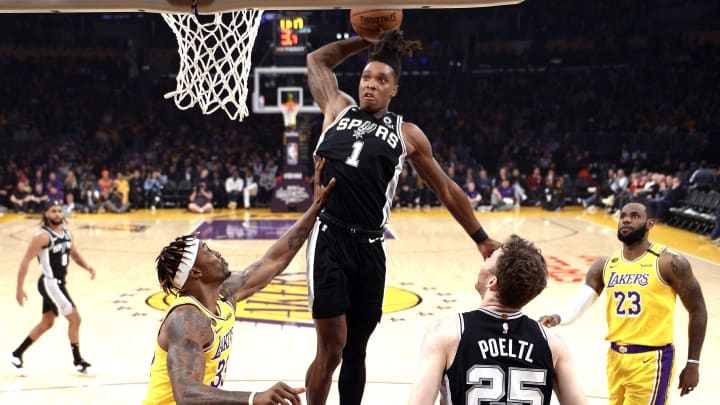San Antonio Spurs guard Lonnie Walker is entering a pivotal season in his career and will have a lot to prove. Walker, who is set to enter restricted free agency next off-season, will be playing for his next contract. A great season could mean a big payday while a subpar season could mean a lack of interest from other teams, possibly resulting in him taking a less than favorable contract.
Factor in lofty expectations from Spurs fans, and he'll have a lot of pressure on him to perform. He certainly appears to be taking notice of everything that's being said about him, both good and bad, which could be used as further motivation. That said, I believe he could learn a lot by looking to another former high-flying Spur in hopes of unlocking his impressive potential.

How Lonnie Walker could learn from Jonathon Simmons' game
Walker and former Spur Jonathon Simmons share some similarities in playing styles but also differ in a couple of key areas. Simmons was a 6-6 shooting guard who, despite only playing two seasons with the Spurs, managed to leave his mark by proving to be one of the most explosive athletes in team history.
Unlike Walker, Simmons went undrafted and later managed to work his way up through the G League before joining the Spurs, showing an impressive level of determination. He even became a key part of the 2016-17 team that went to the Western Conference Finals.
Simmons' role was an interesting one considering he was a shooting guard who couldn't actually shoot. Instead, he provided the team with an athletic slasher who aggressively attacked closeouts, getting all the way to the rim and often finishing with thunderous dunks. Not only that, but he also proved effective at creating for himself and others in the pick and roll while still bullying his way to the rim.
My goodness, Jonathon Simmons ? pic.twitter.com/WYVaewdzBy
— Bleacher Report (@BleacherReport) April 11, 2017
On the defensive end, Simmons was also impactful. He defended with tenacity and made hustle plays like chase-down blocks that helped energize the team. His defense came in handy, particularly in the 2017 Western Conference Semifinals against Houston, where he helped slow down James Harden in Games 5 and 6 and helped the Spurs win the series.
Walker, unlike Simmons, is actually a good shooter. Walker is a career 36.9% 3-point shooter, with nearly 40% of all of his shots taken from beyond the arc. He's also shown the ability to knock down both threes and mid-range jumpers off the dribble, which is an incredibly valuable skill in today's NBA.
The Key to improving is in the attack
Like Simmons, Walker is capable of attacking the basket and creating for others, though he has yet to do so consistently. When Walker does attack, it often appears that he's looking to pass rather than score. While it could be seen as him trying to create for others, it doesn't always result in an open shot. Worse yet, there have been a number of instances where he's passed up a potential dunk or layup for himself.
It's a correctable issue, though he'll need to fix it for him to take his scoring to the next level. After all, he has both the skill and physical tools necessary to average at least 20 points per game. However, it's unclear whether he has the right mindset to be a consistent scoring threat.
In my opinion, he has a tendency to play too passively despite his obvious talent. As a result, I feel that he's underachieved. Simmons, on the other hand, had a more aggressive approach, which allowed him to maximize his talent.
For instance, Simmons was consistently able to force his way to the rim despite defenders sagging off of him due to his poor 3-point shooting. On the other hand, Walker doesn't have the same shooting issues and is an even better athlete but doesn't attack with the same intensity.
Were Walker to take a page out of Simmons' book, he could see an immediate improvement in his play, considering his potential as a finisher. After all, the more aggressive he is in looking for his own shot, the more defensive attention he'll draw, which could lead to him finding open teammates.
Defensively, at 6-4 and with a 6-10 wingspan, Walker has the physical tools to be a great defensive player in his own right. That said, he hasn't quite lived up to expectations on that end either. He is known to make mistakes, some of which may be attributed to a lack of focus. Were he consistently locked in, I believe that he has the potential to be a great two-way player, assuming that he can correct his offensive issues.
Walker, at just 22, is already a better player and more talented than Simmons ever was. However, he could learn a lot from how Simmons played. Ultimately, I feel that Walker could benefit greatly from adopting a similar assertive approach.
